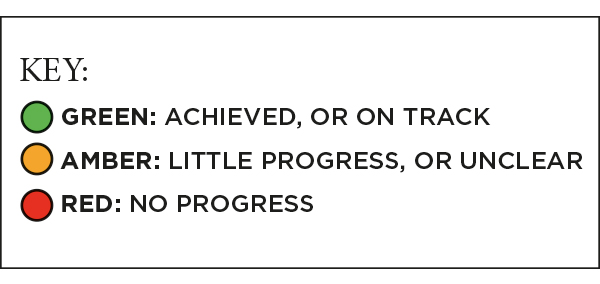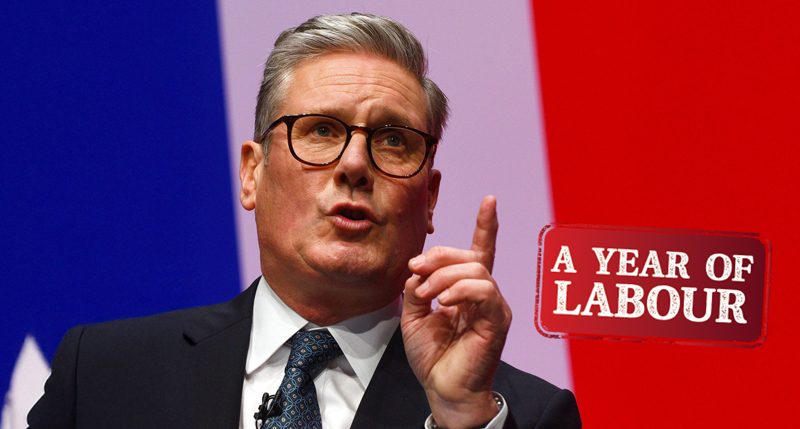The majority of the school reforms pledged in the Labour manifesto have either been implemented or are progressing, a Schools Week analysis has found.
But there has been no progress seemingly made on five of the 30 manifesto policies. They include a pledge to deliver a ‘phonics for maths’ scheme and a teacher training entitlement.
Meanwhile, promised funding for many schemes has yet to materialise.
We’ve rated pledges based on a traffic light system. Policies implemented or on track (with some sort of public commitment or actual date for progress), got green.
Amber went to those where there was little progress, or it was unclear. Note: the 6.5k teacher pledge got amber because it has shapeshifted so much.
Meanwhile red went to the policies where there was zero progress and nothing said in the public domain. We went to the Department for Education with our analysis for each policy, and where they provided response we have included below.

Curriculum, assessment and accountability
1. Launch an expert-led review of curriculum and assessment, “working with school staff, parents and employers”.
A review was launched in July last year. An interim report, published in March, outlined key reform areas under consideration, including reducing the volume of content taught in primary schools and reducing the volume of GCSE exams. The full report is due in autumn.
GREEN
2. Support children to study a creative or vocational subject until they are 16, and “ensure accountability measures reflect this” (Progress 8).
The government does not appear to have said anything publicly on this. However, the curriculum review is looking at accountability and reviewing the EBacc.
AMBER
3. A “phonics for maths” programme in primary schools
No progress.
RED
4. Fund “evidence-based” early-language interventions in primary schools.
In May, it was announced the early language support for every child pilot had been extended for another 12 months, with slightly less cash than previously (£3.4 million). But ministers hope it will help 20,000 more youngsters than the 20,000 already supported in about 200 schools.
GREEN
5. Introduce new regional improvement teams to “enhance school-to-school support, and spread best practice”.
The first 200 “stuck” schools have been identified for support – but it will take until March 2026 for all of the roughly 600 schools to get help.
GREEN
6. Replace single-headline Ofsted grades with a new report card “telling parents clearly how schools are performing”.
Headline grades were scrapped in September, with new report card inspections due in November. However, there is widespread criticism that schools will not see final inspection plans until September.
GREEN
7. Bring multi-academy trusts “into the inspection system”.
No progress yet, but Ofsted did get a £20 million budget boost at the recent spending review, including to “develop and implement multi-academy trust inspections and increase accountability of MAT leaders”. The DfE said this was a “complex proposal”. Officials are “engaging with the sector and are keen to hear views”.
GREEN
8. Introduce a “new annual review of safeguarding, attendance, and off-rolling”.
No progress publicly. Ofsted said in its Big Listen consultation in September it was “working with government” on the plans, but chief inspector Sir Martyn Oliver said in January that such checks would cost £45 million a year, adding: “It’s right that we ask ourselves ‘is this the best spending of the money?’”
The DfE told Schools Week it was “looking at options” for the reviews as part of its “wider work to reform accountability arrangements”.
AMBER
Recruitment and retention
9. Recruit an additional 6,500 new “expert” teachers into shortage subjects, supporting “areas that face recruitment challenges”, and tackle retention issues.
Details have only emerged recently. It will be based on boosting the net number of teachers by 6,500 when compared with the 2023-24 academic year baseline.
This means not all the 6,500 will be new teachers (current teachers who choose not to leave will count).
There is also no commitment towards recruiting in subject shortages, or in areas with recruitment challenges. Primary schools have also been excluded.
The government said numbers are up by 2,300 – meaning a third of the pledge has already been met
AMBER
10. Review the way bursaries are allocated and the “structure of retention payments”.
No progress.
RED
11. Update the early career framework, maintaining “its grounding in evidence”.
The ECF has been updated, and is now known as the “early career teacher entitlement” (ECTE). A full review will be held in 2027.
GREEN
12. Ensure any new teacher entering the classroom “has, or is working towards”, qualified teacher status.
Proposals are in the schools bill and are due to be implemented in September next year. But unqualified teachers already employed before that date won’t have to get or work towards QTS, unless they move to a new school.
GREEN
13. Introduce a teacher training entitlement to “ensure teachers stay up to date on best practice with continuing professional development”.
No progress.
RED
14. Reinstate the school support staff negotiating body, which will “help address the acute recruitment and retention crisis in support roles”.
Consultation launched last month.
GREEN
15. Create a new excellence in leadership programme, a “mentoring framework that expands the capacity of headteachers and leaders to improve their schools”.
Nothing said publicly. The government will also not renew the chief executive development programme, run by the National Institute of Teaching.
RED
SEND, inclusion and mental health
16. Take a “community-wide approach” to SEND, improving “inclusivity and expertise in mainstream schools, as well as ensuring special schools cater to those with the most complex needs”.
White paper is due in autumn, with £1 billion extra high-needs funding delivered and £760 million for SEND reforms in the spending review
GREEN
17. Make sure admissions decisions “account for the needs of communities”.
The schools bill includes new duties for trusts and councils to co-operate on admissions and new powers for local authorities.
GREEN
18. Require all schools to “co-operate with their local authority on school admissions, SEND inclusion, and place planning”.
See above.
GREEN
19. Provide access to specialist mental health professionals in every school, so “every young person has access to early support to address problems before they escalate”.
The government has upped funding, meaning 900,000 more pupils and 1,700 schools will be able to access support by April next year – but it won’t reach all schools until 2030.
AMBER
Cost of living
20. Fund free breakfast clubs in “every primary school, accessible to all children”.
A trial has been launched in 750 of the roughly 16,000 primaries – but no details of when they will be rolled out to all schools. It is unlikely to be anytime before 2026.
AMBER
21. Bring down the cost of school by “limiting the number of branded items of uniform and PE kit that schools can require”.
The schools bill proposes primary schools will be limited to three branded items of uniform, and secondaries four items, from September next year.
GREEN
Other policies
22. Open an additional 3,334 nurseries through upgrading space in primary schools.
First 200 nurseries to open this September offering 4,000 places.
AMBER
23. Guarantee two weeks’ worth of work experience for every young person.
Guidance updated, with a new expectation for schools to begin in September – but no extra cash to fund it.
GREEN
24. Improve careers advice in schools and colleges.
Pretty vague commitment, but DfE did not provide any update.
RED
25. Improve data-sharing across services with a single unique identifier for children.
In the schools bill.
GREEN
26. Bring forward a “comprehensive strategy for post-16 education”.
A skills white paper is due any minute.
GREEN
27. Protect time for physical education, and support the “role grassroots clubs play in expanding access to sport”.
Every school’s sport and enrichment offer will be published in new school profiles.
AMBER
28. Launch a new national music education network – a “one-stop shop with information on courses and classes for parents, teachers and children”.
National centre for arts and music education promised to launch in September 2026, with £25 million investment in new musical instruments.
GREEN
29. Ensure schools “address misogyny and teach young people about healthy relationships and consent”.
No public progress, but the government said it is reviewing the relationships, sex and health curriculum.
AMBER
30. Introduce a supervised tooth-brushing scheme for 3 to 5-year-olds, targeting the areas of highest need.
Councils got £11 million in April to help “hundreds of thousands” of children in the “most deprived” areas brush their teeth.
GREEN
Where’s the promised money?
The costings are harder to work out – but many schemes have so far been funded at way less than promised.
For instance, the government promised to invest £315 million for its breakfast clubs from closing the non-dom tax loophole. But just £30 million has been allocated.
It said it would use £1.5 billion raised from putting VAT on private school fees to pay for many of its other pledges.
This included £450 million to recruit 6,500 new teachers. The government pointed to the £700 million spent to boost recruitment and retention in 2024-25, however this included already established retention payments.
Meanwhile, £5 million was promised for early language interventions, but just £3.4 million was announced. For mental health support, j£49 million of the £175 million promised has been forthcoming so far.
Of the £45 million promised for Ofsted, £20 million has seemingly been committed. And just £37 million of the funding for new nurseries has been delivered of the £370 million promised over four years.
Another £270 million was promised to increase teacher and headteacher training and £85 million for work experience and careers advice – but it’s not clear if any of this has been delivered yet.








Your thoughts